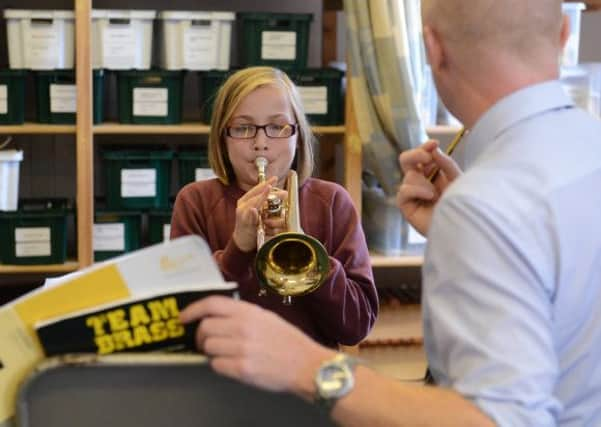Outcry as councils look to up music fees


Clackmannanshire Council has put forward budget proposals to raise instrumental tuition fees from £220 per year to £450 next year, making it the most expensive place in Scotland to learn a musical instrument.
Stirling Council meanwhile, is proposing the withdrawal of visiting specialist music teachers, effectively wiping out classroom music lessons for primary school pupils, as well as restructuring its charging scheme.
Advertisement
Hide AdAdvertisement
Hide AdThe revelations came as part of local authority budget proposals for the future financial years, which are being put out to public consultation.
Scotland on Sunday’s Let the Children Play has been campaigning for instrumental tuition fees to be scrapped in councils across Scotland since September 2012. There are currently 22 local authorities charging between £95 and £340 per year for a children to learn a musical instrument –something that was free a generation ago. The Scottish Government recently announced it would implement 17 recommendations to improve instrumental music tuition provision across Scotland, following a government report sparked by our campaign. The government announced in June, following pressure from this newspaper, that it would scrap tuition fees for children sitting SQA music exams.
Mark Traynor, convener of the EIS’s Instrumental Teachers’ Network, condemned the Clackmannanshire proposal.
He said: “The EIS are disappointed to hear that Clackmannanshire are proposing to increase fees to an incredible amount of £450, and we would urge them to ensure to continue equity of delivery of service.”
One music teacher said the rise, which far outstrips Aberdeen City Council’s charges of £340 – currently the highest in the country – would mean the effective privatisation of instrumental music.
“If you’re teaching 100 pupils a week at £450 per year it’s roughly £45,000 per year. Instrumental music teachers are being privatised slowly through the back door,” the teacher said.
A spokesperson for Clackmannanshire Council said: “This proposal is one of a number put forward by officers which are currently subject to public consultation.”
Stirling Council’s proposal could mean the withdrawal of visiting specialist music classroom teachers from primary schools. It also proposes switching its charging structure to a flat fee of £240 per lesson.
Advertisement
Hide AdAdvertisement
Hide AdChildren receiving group tuition currently pay £189 per year, while those on individual tuition pay £309. A further proposal suggests “maximising” group lessons, meaning less individual tuition would be available.
A Stirling Council spokesperson said: “Stirling Council is making every effort to maintain music tuition by putting forward proposals to expand the service to offer more children group tuition, and to increase charges for those families who can afford to pay a little more. If these proposals are agreed, the music tuition service will be sustained and even more children will be able to access it.”
However the withdrawal of visiting specialist music teachers is listed as a stop/reduce option, meaning the council has identified it as “undesirable” and will only be acted on if savings cannot be made through other options.
Withdrawing the service would save the council £573,000 over the five year period covered by the report. There are also concerns that the council’s music service could be under threat when Stirling has also committed £320,000 in the current year for the Big Noise Project, run by Sistema Scotland, which offers free instrumental music tuition to children in the Raploch area of the city.
One concerned resident said: “The position of the council seems to be that the delivery of music teaching in primary schools does not have to be done by music specialists. There are, of course, a number of mainstream primary teachers with a knowledge and enthusiasm for music, but they are not plentiful.”
The resident added: “In any case, it should not be a matter of pot-luck whether a primary aged pupil receives meaningful music education or not. Specialist music teaching in primary schools has been going on in Stirling since the late 1950s. It has a strong record of delivering good quality music education which has complemented the work of the instrumental service.”
Local MP Anne McGuire said: “Stirling Council has always been a great supporter of music education for school children. Music education is not just an add-on to mainstream subjects and therefore should not be seen as disposable.
“In spite of the very difficult decisions facing both the council and local communities, I trust that the importance of music in our schools will still be recognised and supported.”
Twitter: @emmacowing